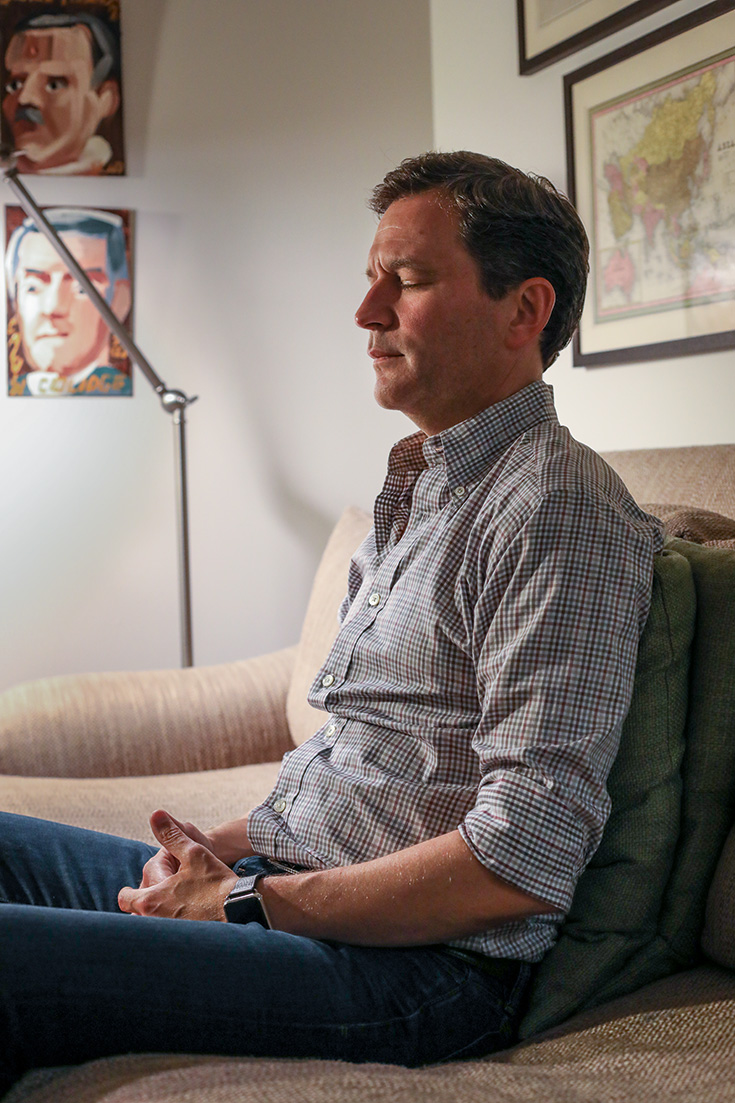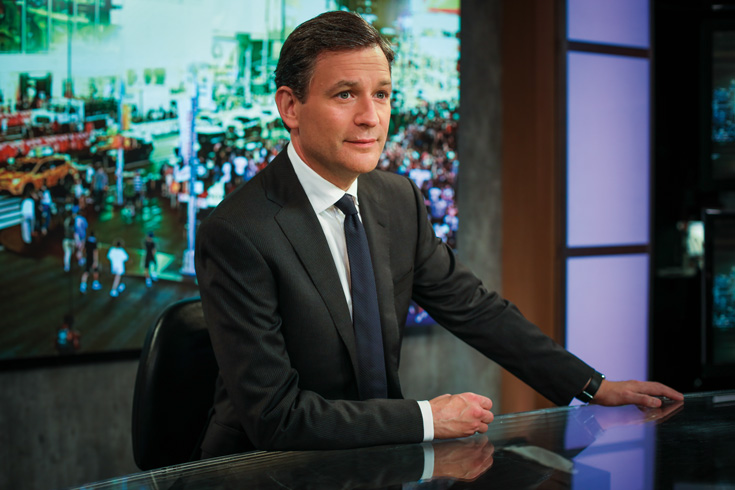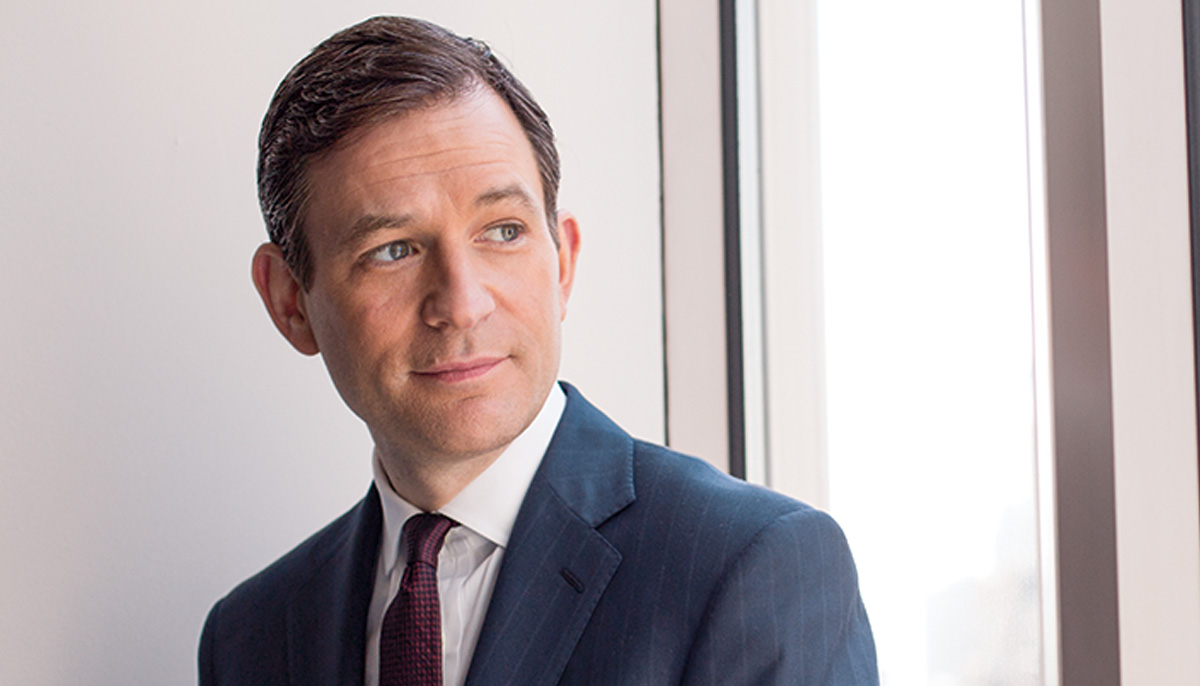Dan Harris sits up straight on a beige love seat in his thirteenth-floor office, his hands resting on his lap in the cosmic mudra. It’s a posture that might seem, to some, at odds with his job at ABC News. His slightly graying, impeccably trimmed hair is parted on the left side in the classic newsman style. His boyish face is calm, his eyes nearly closed. He’s still dressed in his street clothes, a purple-and-blue-checked button-down shirt and jeans. His Apple Watch is timing his pre-broadcast meditation.
Harris’s quiet office is lined with books, almost all of them about Buddhism and meditation: The Birth of Insight by Eric Braun and Altruism by Matthieu Ricard. Copies of his own book, Meditation for Fidgety Skeptics, surround the spot on his shelf holding his Emmys. There’s a TV mounted to the wall, but it’s currently off. It’s dark outside, but the city lights—particularly the red Hotel Empire sign nearby—twinkle through the window. Soon he’ll put on a suit and head down to the lights, cameras, and action of the Nightline studio broadcast. But for now, a moment of quiet.
It’s exactly this combination of calm moments of practice and high-pressure, broadcasting-to-millions work that has helped Harris to become an ideal lay spokesman for Buddhist practice in current times. He’s written two New York Times bestselling books about meditation for the relatively uninitiated—10% Happier and Meditation for Fidgety Skeptics. From there, he built what’s starting to look like a secular empire, thanks to the successful 10% Happier app, which includes dozens of meditation courses and guided meditations, all led by well-known Insight Meditation Society teachers such as Joseph Goldstein, Sharon Salzberg, and JoAnna Hardy. The app has raised five million dollars in venture capital funding and spun off a weekly podcast hosted by Harris.
“If this is, and I believe it is, the next big public health revolution, I would like to be a contributing catalytic force,” Harris says. Then he undercuts the grandness of that statement by adding, “I don’t see it as much more than that.”
The books, the app, and the podcast have all grown out of Harris’ pragmatic, skeptical approach to meditation. “I don’t know if I believe in enlightenment per se, but it’s scientifically proven that the mind is trainable,” he says. “All the things we want most in our lives—patience, calm, compassion, mindfulness—these are not factory settings that can’t be tinkered with. They can be trained, and that’s the central promise of Buddhism as I understand it.”
As he discusses his news career and growing the 10% Happier business, Harris rocks backward on a gray office chair, his feet, in white running shoes, resting on a coffee table. He’s funny and personable, with an ease he’s honed at the anchor desk of Good Morning America on weekends. In person, he’s just like the guy you see on TV, but with an extra sprinkling of swear words and more relaxed posture.
If we want more people to be sane, which we do, we have to deliver the practice in a way that’s palatable.
Harris is honest about his commercial ambitions for his growing empire. “The crass and mercenary side of it was that I had an entrepreneurial sense that this was interesting information, but people weren’t talking about it in a way that was widely accessible,” he says. “And I thought maybe I could do that because I had several decades of training in communicating to broad audiences.”
But Harris is clear about the role he wants to play: luring the skeptical and scared masses to meditation. “I see myself as a gateway drug,” he says. “My real goal is to push people toward doing the thing.” As soon as interested parties log into the app, he hands them over to those trained teachers. “I make a lot of jokes with the word ‘fuck’ in them and tell embarrassing stories about myself to wake people up to the idea that the mind is trainable. Then I can bait-and-switch you and say, ‘Here’s Sharon Salzberg.’”
When Harris first approached Salzberg about working with him on the app, he gave it to her straight, saying, “You people think you’re so mainstream? You’re not.” He would, he promised, be the American Buddhist world’s conduit to the masses.
The plan appears to be working. The 10% Happier company doesn’t release specific user numbers, but says people have clocked in for more than fifty million minutes of mindfulness. The podcast has been downloaded more than ten million times. Goldstein and Salzberg have both encountered new students on retreats saying they came after being introduced to meditation through the app. Salzberg says, “A middle-aged man came up to me, crying, and said, ‘I’ve been trying for seventeen years to practice. I now have a reliable practice. I had a breakthrough because of the app.’”
Harris’s regular-guy aversion to “woo-woo” spirituality makes him the perfect conduit to the masses—and a great fit for Buddhism, Goldstein says. “I appreciate the combination of his dedication to the practice and his skeptical mindset,” he says. “It’s something the Buddha himself recommended—not to take things on blind faith but to really investigate it.”

Dan Harris has been applying his journalist’s mentality to Buddhism since 2008, when a series of chance events in his life led him to practice. It began in 2004, when he had a panic attack on national television during a broadcast of Good Morning America. He had struggled with anxiety and depression since returning, the year before, from war zone coverage in Afghanistan, Israel, Palestine, and Iraq. To cope, he had turned to sporadic use of cocaine and ecstasy, which, he later learned, only compounded the chances that he’d eventually have a panic attack.
At the same time, his boss at ABC’s World News, Peter Jennings, assigned him to cover religion. He resisted, pleading intense skepticism. Jennings wasn’t swayed. Soon enough, Harris was digging into his new beat enthusiastically, finding it full of juicy stories from politically powerful evangelicals to mosques facing a post-9/11 world to the growing self-help movement. In 2008, a producer recommended he read a book by Eckhart Tolle, the Oprah-approved guru who wrote The Power of Now and A New Earth. Harris read some Tolle, thinking the author might make a good story.
Harris was both intrigued and appalled as he paged through Tolle’s work. Most of it was nothing more than what he calls “pseudoscientific assertions” and “grandiose claims.” But one thing Tolle said sparked his first real spiritual realization: that we all have a “voice” in our heads, an ongoing conversation that isn’t necessarily helpful. It judges and prods and generally jerks us around, encouraging us into mindless coping mechanisms like doing a little coke. But if we could just separate ourselves from that voice, Tolle taught, we could make some serious headway in life.
Harris interviewed Tolle, eager to figure out what to do with this insight. But he was disappointed when he asked Tolle for practical advice in dealing with the voice and Tolle’s only answer was, “Take one conscious breath.” That hardly seemed like enough.
It wasn’t until Harris complained about his frustration with Tolle’s wisdom and its limits to his then-fiancée, Bianca (now his wife), that he made some headway. She said Tolle’s insight sounded an awful lot like Buddhism. She recommended Harris read Mark Epstein, a New York City–based psychiatrist who writes about Buddhism and psychotherapy. His works up to that point included Psychotherapy Without the Self and Thoughts Without a Thinker.
Like a good journalist, Harris not only read Epstein’s work but tracked him down. He began meeting regularly with Epstein, asking questions about the Buddhist path and recording the conversations, taking the same methodical approach he would to assembling a journalistic piece for the air.
Soon Sharon Salzberg was conscripted as well, introduced to Harris by Epstein. Harris and Salzberg would meet for breakfast and more recorded conversation. “He’d ask these questions, these very deep and profound questions, as I was trying to eat my eggs,” Salzberg recalls. “He certainly was a seeker. He was seeking understanding.”
Many of those conversations made it into Harris’s first book, 10% Happier, which included the story of his breakdown and his journey into Insight Meditation and Buddhism as a solution. The idea for the book was not an easy sell to publishers.
“One brave editor bought it,” Harris says. The first print run was fifteen thousand, a low number for a large, commercial publisher. “Not only did that show a lack of confidence, but they also tried to bargain me up to 20% Happier.”
He held firm on his original title, and it paid off. The book became a surprise blockbuster when it was released in December 2014, and now there’s a special fifth-anniversary edition. “What was humbling was that the success was not about me,” Harris says. “I often joke that there are no original ideas in the book. It’s not that people are interested in me, it’s really just that I got them interested in meditation.”

In early 2016, Harris was approached by a Boston-based startup called Change Collective, which at the time was offering an app that featured a series of behavior-change courses. Going Paleo, getting up earlier, having more gratitude, that sort of thing. The founders asked Harris to spearhead a meditation course for them. He agreed to do it only if Joseph Goldstein, as a teacher trained in a traditional Buddhist lineage, could be a part of it. Change Collective agreed, and Goldstein and Harris put together a fourteen-day video course accompanied by a guided audio meditation. It was such a success that the company’s founders partnered with Harris to pivot their business model: instead of multiple behavior courses, they would make an app dedicated to nothing but meditation, called 10% Happier.
He’d be the face of the app, which he saw as a good strategy. “I’m not robed, I’m in the world hustling, I’m getting my hands dirty,” he says. “It’s very different from how most people talk about meditation.” But Harris insisted on involving accredited Buddhist teachers in the app from the beginning, Goldstein and Salzberg chief among them.
As 10% Happier took off, Harris also progressed at work. He was named anchor of ABC’s news magazine Nightline and weekend co-anchor of Good Morning America. ABC News also produces his weekly 10% Happier podcast, on which he interviews prominent meditators such as Awake in the Wild retreat founder Mark Coleman, Long Island Center for Mindfulness founder Cory Muscara, and Scandal star Bellamy Young. He seems to have mastered the art of leveraging his news platform to spread the word about meditation while continuing to cover other stories as well.
Harris’s personal life progressed, too. He married Bianca, a doctor, in 2009, and their son, Alexander, was born in 2014. Having a toddler, he says, “has tested my practice, because he’s always either very frustrating or incredibly boring. You definitely have plenty of opportunity to be mindful of strong emotions.”
Building the 10% Happier business while tending to his news career and family is chief among his current challenges. He’d like to add to the current roster of half a dozen or so teachers featured on the app, ideally from traditions besides Insight. Eventually he envisions adding retreats, Skype calls with meditation coaches, and meditation centers to the business model.
“We’re definitely going to look for what the kids call IRL stuff,” he says. (That’s “in real life” for the non-kids among us.) “But the thing I’ve learned about startups is that lack of focus will kill you. We have to nail the app thing first. Our app is pretty good, but we have a lot of stuff we need to work on, so it’s got to be one step at a time.”
More immediately, Harris is working on a follow-up book to 10% Happier about compassion—or, as he describes it, “not being an asshole.” The book will include his signature approach to spiritual topics. “I’m skeptical of the way kindness is talked about,” he says. “It’s a little ooey-gooey and either bland and not actionable or finger-waggy and so preachy that it’s off-putting. My goal is to reframe it in terms of self-interest—people are actually happier and healthier and more successful because of compassion. That’s the way the Dalai Lama talks about it, and I’m happy to steal from him.”
Harris’s research has included a one-on-one, ten-day meditation retreat with Spirit Rock teacher Spring Washam and a harrowing “360 review” conducted by mindfulness-based professional coach Jerry Colonna, who is known, Harris says, as “the Yoda of Silicon Valley.” The 360 review, which will form the narrative of Harris’s book, included sixteen video interviews with people from Harris’s personal and professional lives. The resulting forty-one-page report “was devastating,” he says.
“It particularly focused on ways in which I’m an asshole. I asked them to take a look at that, and then the report came and it just blew me away. It was incredibly harsh. My brother read it and he said, ‘I’m sorry you had to read this. And you now have a good book.’” The resulting story of his journey to become less of an asshole is scheduled to hit bookstores in early 2020.
Harris isn’t putting himself through this public trial for nothing. He believes programs like 10% Happier can play a key role in the future of American Buddhism—whether or not anyone calls it “Buddhism.” When he first started searching for answers and meditating, he didn’t call himself a Buddhist, and he thinks a lot of 10% Happier meditators feel more comfortable that way too.
“If we want more people to be sane, which we do, we have to deliver the practice in a way that’s palatable,” he says. “Do I think it would be awesome if everybody was a Buddhist? Yes. But most people are not interested in Buddhism, and I think we have to meet them where they are.”
Harris, on the other hand, is not quite the detached skeptic he used to be. He happily identifies as Buddhist, he’s discovered an alarmingly sentimental side with fatherhood, and he’s a vegan now.
“When he was first conceptualizing the app, it was very much, as he would say, for people like him, cynical or sarcastic,” Salzberg says. “The truth is, that may be part of his persona, but he’s such a sincere practitioner.”
Dan Harris’s thousands of listeners and followers will probably stick with him—and their meditation practices—as long as he keeps those “jokes with the word ‘fuck’ in them” coming. And maybe even if he doesn’t.

